你或许曾经刷到过这样一段视频↓

图源:B站@墨韵随步摇
这段用古筝弹奏的《千本樱》被B站收录进“入站必刷98大视频”之一,播放量已达到6000万次以上。
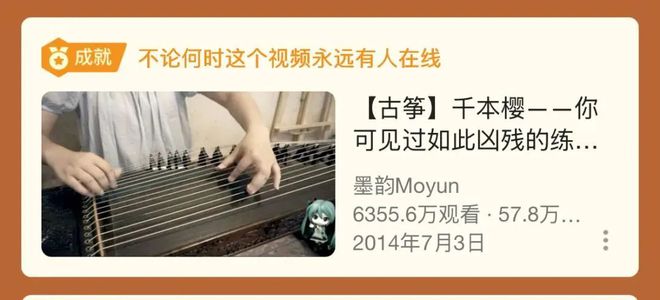
图源:B站
无论何时点开这个视频,永远都有人在线观看,永远都是刷屏的弹幕。
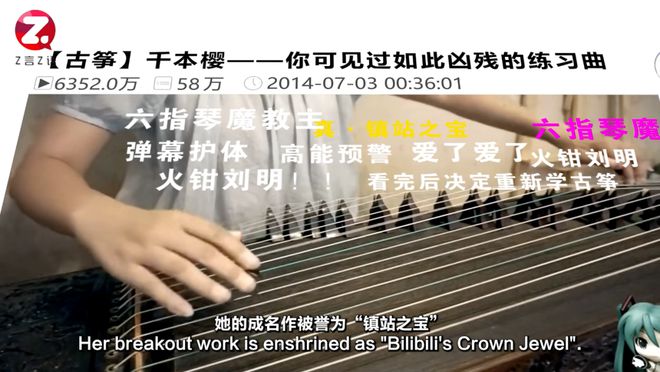
弹奏出这段视频的博主“墨韵”,也因此成为了弹幕传说,被粉丝称为“六指琴魔”“古筝教主”。
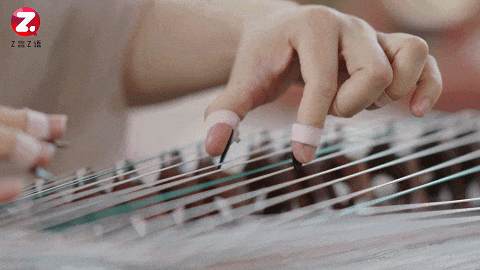
而在海外社交媒体平台上,她的作品同样惊艳了无数外国人,一曲用古筝弹奏的《加州旅馆》,播放量突破2000万。

蒙面女孩+中国古筝,这个一人一琴的组合还在不断破圈,从弹幕传说到全球爆火,目前墨韵的作品海内外的全网播放量已经破亿。

戳下方视频,了解面纱之下她的更多故事↓↓↓
“出道即巅峰”的“镇站之宝”
2014年,当时还是学生的墨韵,用古筝弹奏了二次元歌曲《千本樱》,并第一次将视频发布到了B站上。很快,这支视频便获得了大量网友的关注和膜拜:这手速无敌了……
Since 2014, she has been uploading her adaptations of pop music to Bilibili, a Chinese video-sharing platform. One of her early videos - a cover of the hit Japanese song
Senbonzakura- quickly gained millions of views. The video became known as "Bilibili's Crown Jewel" and earned her the nickname "GuzhengGuru" in bullet comments from netizens.
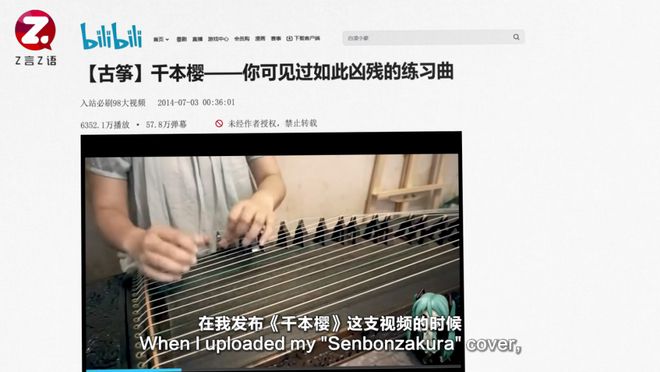
但这支被网友们称为“镇站之宝”视频的爆火,并没有给墨韵的生活带来太多的影响。“当时我还在上学,上网的时间也并不多,所以在以学业为重的阶段,我的现实生活并没有因为这个视频的走红有太多的波澜。”
Despite the rapid success, Moyun didn't let it disrupt her life. "I was still a student at the time, and during those years focused on studying, the video's sudden popularity didn't really change my daily routine," she recalled.
不过,网友们带来的许多正向积极的反馈,也让一个职业选择的想法在墨韵的心里逐渐生根发芽 ——要做自己真正喜欢的事情。
But the wave of positive feedback from the audience greatly inspired her to follow her passion for the
guzheng
“虽然我不是科班出身,但我也是从小学习古筝,非常喜欢这个乐器,所以我觉得相比我原来的专业,作为一个古筝创作者对我来说是更好的选择。”
"Even though I wasn't professionally trained, I've been playing the
guzhengsince childhood and have always loved it," she said. "So, compared to my original major - which is teaching Chinese as a second language - becoming aguzhengcontent creator after graduation felt like a clearer calling."
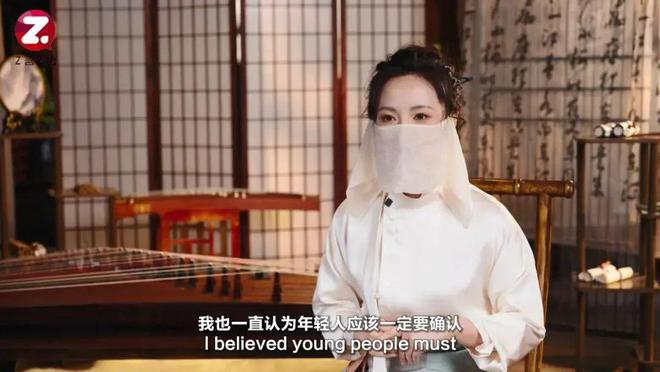
打破古今中外“次元壁”
带着对古筝的热爱,墨韵踏上了“古筝博主”之路。作为一名二次元爱好者,她最开始翻奏的类型就是二次元音乐。
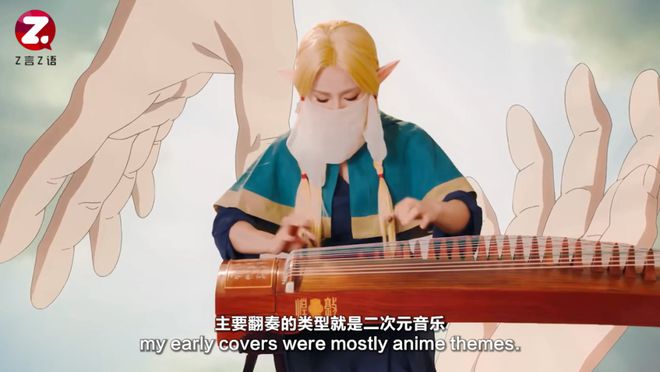
但后来,这些“次元壁”都被她不断打破,不仅弹出了《权御天下》《万神纪》等一首首中国风精品,还和三星堆博物馆、游戏《黑神话:悟空》玩起了跨界联动。
According to Moyun, her inspiration comes from the music she loves and her daily life. As a native of Chengdu in Southwest China's Sichuan province, she feels a deep connection to Sanxingdui, an ancient archaeological site known for its mysterious and significant Bronze Age artifacts. This connection led her to collaborate with the Sanxingdui Museum on a musical piece that promotes Chengdu's culture in her own way.
Gaming is another big part of her life. "After
Black Myth: Wukongwas released, I rearranged some of its tracks for theguzheng, which really resonated with many game fans," Moyun said.
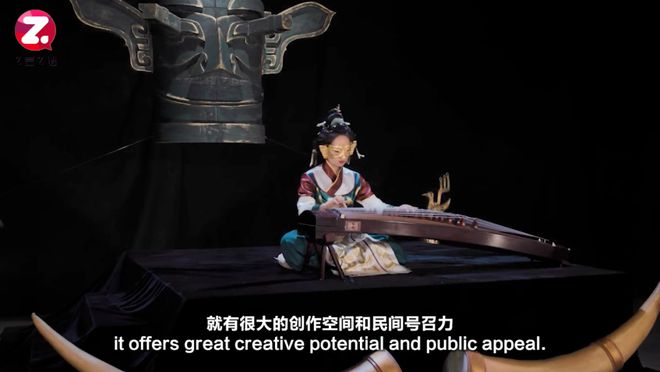
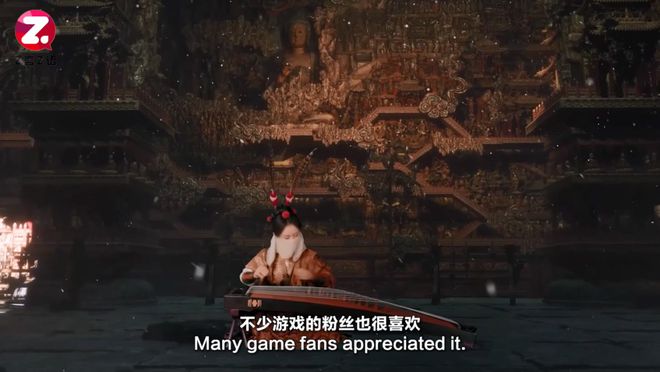
而在近几年,西洋乐器的曲目一直也是墨韵改编创作的重要灵感来源。“比如说老鹰乐队的《加州旅馆》这一首曲目,它的调式非常的适合古筝演奏。”
In recent years, Western instrumental repertoire has become a major source of inspiration for Moyun's adaptations.
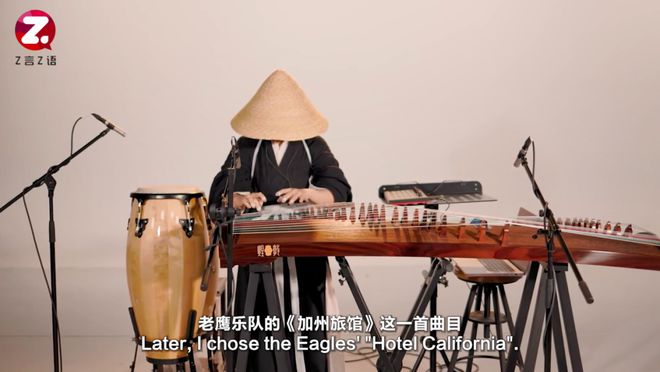
在研究了它的段落之后,墨韵发现它的伴奏和声有很多重复的地方,所以想到了用“loop”的方式来呈现。
"The modes in the original song fit the
guzhengbeautifully," Moyun said. "After analyzing its structure, I noticed repeating harmonic patterns, which made looping a natural choice."
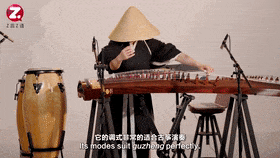
加之“旅馆”这个意象和中国古代的客栈比较相似,所以她在造型方面也参考了《新龙门客栈》这一部电影。
The video's appeal was enhanced by her costume, which evoked the Wei and Jin dynasties (220 - 420), featuring a wide-sleeved robe and a hand-woven straw hat that partially concealed her face.
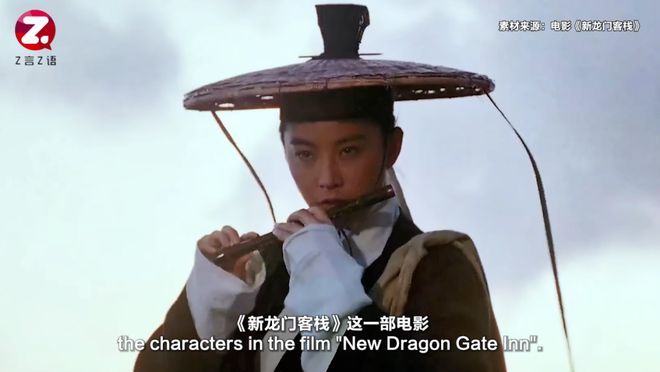
不是zither不是koto是guzheng
在墨韵看来,和不同文化背景的人分享中国传统乐器,然后互相交流学习是一件非常有趣的事情。“所以我也想到了在海外的平台去发布我的视频。”
For her, sharing traditional Chinese instruments across cultures and engaging in mutual learning is fascinating. "That's why I also post my videos on international platforms like YouTube," she said.
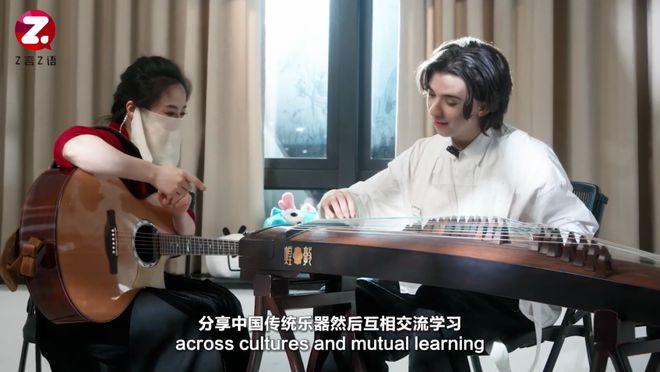
很多外国网友在看完墨韵的视频后,也都在留言问,“这是一个什么乐器,我从来没有见过”。
After watching her videos, many foreign viewers has been amazed by her performance while asked similar questions - "What instrument is this? I've never seen it before."
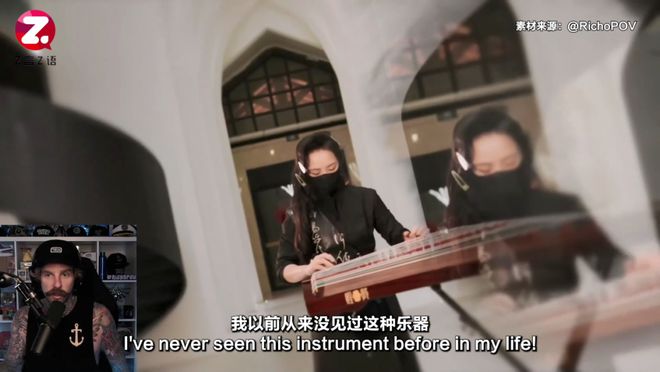

也有一些网友,会把古筝错认成日本筝 (koto)。
While some international viewers may mistake
guzhengfor koto - a Japanese plucked string instrument.
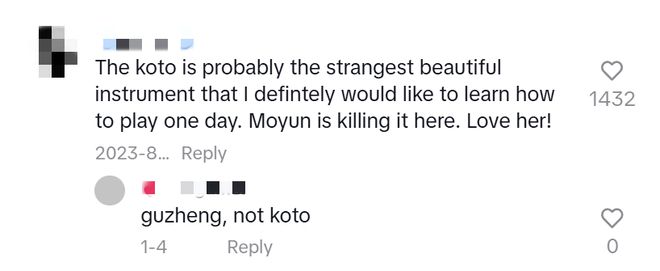

墨韵认为,一直以来国内的翻译工作者,都尝试用英文已有的词汇来翻译中国特有事物,但其实有些时候并不够准确。
“比如说现在还有很多地方用‘zither’来翻译古筝,但其实‘zither(齐特尔琴)’是德国(及奥地利)的一种传统乐器。”
To Moyun, it's unfortunate that the
guzhengremains relatively unknown outside of China, and that some viewers even mistake it for the koto, a Japanese plucked string instrument. She also finds the common English translation, "Chinese zither", inaccurate.
"Chinese translators have historically used existing English words for Chinese concepts. Many still call the
guzhenga 'zither', but the zither is a German or Austrian instrument," Moyun explained.
但墨韵相信,这一代年轻人能够让古筝等中国传统乐器走向世界。
“只要以后我们在更大的世界舞台自信的去展示古筝,演绎古筝,并且叫出它的名字,就可以让更多人知道原来这个乐器叫做古筝。”
"I believe that when we present the
guzhengwith cultural confidence on global stages - introducing it proudly by name -guzhengwill become the accepted universal term," she said.
接下来,墨韵还会继续深耕“古筝”这一赛道,让越来越多的人欣赏到中国乐器之美。
“永远不要局限于眼前,而是要放眼到更多更大的世界去。”她如此说道。
来源:21世纪英文报
China Daily精读计划
每天20分钟,英语全面提升!
 晋ICP备17002471号-6
晋ICP备17002471号-6